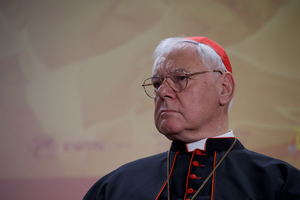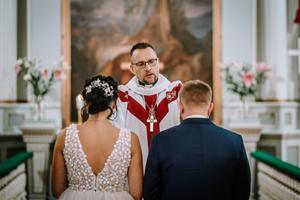Vatican Creates Commission to Improve Communications
The members of the newly created committee are Msgr. Dario Edoardo Vigano, Paolo Nusiner, Msgr. Lucio Adrian Ruiz, Jesuit Father Antonio Spadaro and Msgr. Paul Tighe.

VATICAN CITY — Pope Francis’ new commission to implement recommendations on reforming Vatican communications is likely to comprise removing unnecessary duplication of services and using resources more efficiently to increase the Holy See’s outreach.
The newly created five-person body will examine the recently completed final report of the 11-member Vatican Media Committee, headed by Lord Christopher Patten, a former chairman of the BBC Trust. That report contains a series of reforms that have yet to be publicly disclosed.
The Vatican said Pope Francis “favorably accepted” advice given to him to create the new commission at the last meeting of the “C9” council of cardinals in mid-April, and he decided to institute the commission on April 23.
The C9 is assisting the Holy Father on the governance of the universal Church and drawing up a plan for the revision of the apostolic constitution Pastor Bonus on the Roman Curia.
The new media committee will be headed by Msgr. Dario Vigano, 52, director of the Vatican Television Center. Its other members are:
Paolo Nusiner, the only layperson on the commission, who is general director of the Italian bishops’ daily newspaper Avvenire. Nusiner has formerly worked at the consultancy firm Deloitte & Touche in Milan and is an adviser to Italian associations of newspaper editors and Christian business leaders.
Msgr. Lucio Adrian Ruiz, 50, is head of the Vatican Internet Service within the directorate of telecommunications of the governorate of Vatican city state. He also designed the website for the Congregation for Clergy.
Another member of the new committee is Jesuit Father Antonio Spadaro, the director of the Jesuit magazine La Civiltà Cattolica. Father Spadaro conducted the first major interview with Pope Francis in 2013. He is known to be close to the Holy Father and part of his inner circle of media specialists.
Finally, Irish native Msgr. Paul Tighe, 57, secretary of the Pontifical Council for Social Communications, has been appointed a member of the committee. Both he and Msgr. Adrian are the only appointees who were members of the previous Vatican Media Committee.
Pursuing ‘Feasible Approaches’
Some observers noted with regret that all but one on the new committee are clergy, only one is non-Italian, and no women are members. Most of them favor new media and new technologies, which may be to the detriment of Catholic media in developing countries. Some involved in the process of consultation have also complained that too few people were consulted and that, remarkably, the director of the Vatican Press Office and Vatican Radio, Jesuit Father Federico Lombardi, wasn’t even asked for his views.
The Vatican said the new committee will suggest “feasible approaches” to implementing the final report. Msgr. Tighe told the Register May 1 that the aim of the new body is to “sketch out” implementation of the previous report, but he preferred not to disclose further details at this time.
Cardinal George Pell, a member of the C9, said last year the objectives of the reform were to adapt the Vatican’s media operations to “changing media consumption trends, enhance coordination and achieve progressively and sensitively substantial financial savings.”
The Australian cardinal, who heads the Vatican Secretariat for the Economy, stressed that “the priority is not economic,” but about using resources more efficiently to reach the greatest number of people possible. He said cost-cutting must not “diminish our outreach.”
The Vatican has nearly a dozen separate communication outlets and offices, many of which duplicate each other’s work and operate independently of one another.
They include the Pontifical Council for Social Communications, the Vatican newspaper, L’Osservatore Romano, Vatican Radio, Vatican Television Center, Vatican Information Service, the Vatican press office, Fides missionary news agency, the main Vatican website (Vatican.va), the News.va news aggregator, the Vatican publishing house LEV and the Vatican printing press.
Vatican Radio
Last year, Cardinal Pell hinted that Jesuit-run Vatican Radio, which employs more than 400 staff and broadcasts in 45 languages, could face cuts, as he believes it reaches fewer and fewer people. But this is being vigorously contested by some within the organization, who say that in a world of confusion and error, the popularity of Vatican Radio and Catholic radio in general is increasing, especially in the developing world, as is radio’s social-media outreach.
The first radio station in the world, nicknamed the “grandmother of radio stations,” after it was established in 1931 by radio inventor Guglielmo Marconi, Vatican Radio is widely syndicated and carried on Catholic stations worldwide.
The radio station has also ventured into the area of social media, utilizing YouTube, Twitter and Facebook with considerable success. Vatican Radio’s Facebook page in English has become the most popular Facebook page of any organization in the Holy See, with almost 700,000 “likes” and reaching on average close to three million visitors a week.
The Need for Increased Efficiency
Sean Patrick Lovett, head of Vatican Radio’s English section, does recognize, however, the need for increased efficiency. Already, his section is assimilating with other English-language sections catering to Asia and Africa. The Vatican has also imposed a staff-hiring freeze on the broadcaster, along with other Vatican departments.
And many agree on other aspects of reform.
For example, Vatican Radio, Vatican Information Service, L’Osservatore Romano and the Vatican Secretariat of State all do independent translations, often of the same texts. Time expended on translating by radio staff means fewer programs, Lovett said, and so it would make sense to have a centralized translating department for all media.
With its extensive, up-to-date and established infrastructure, along with its worldwide name recognition, radio is seen by some as the logical entity in which to incorporate and centralize all of these duplicated services.
Edward Pentin is the Register’s Rome correspondent.
- Keywords:
- edward pentin
- evangelization
- fides news agency
- new media
- pontifical council for social communications
- pope francis
- radio
- vatican communications
- vatican information service


















